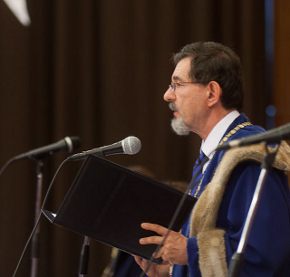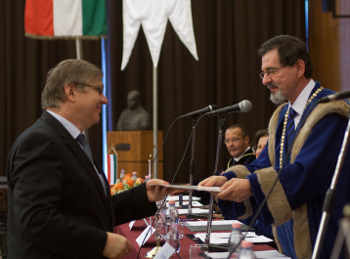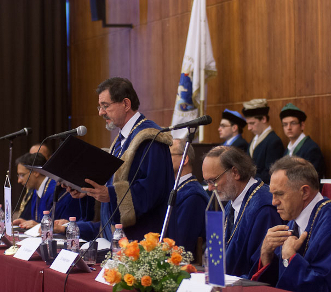Semmelweis University paid hommage to its namesake on the occasion of the 194th anniversary of his July 1 birth. The birthday of Ignác Semmelweis also marked the closing ceremony of the 242nd academic year, which featured the presentation of numerous honours and university appointments.

In his ceremonial address, Dr. Ágoston Szél, rector of Semmelweis University, spoke about his leadership creed, touching also upon his reasons for choosing to undertake the leadership of the University. In his opinion, it is the healthy and cultivated individuals who are the pledge of our future, adding that an institution of higher education focusing on the health sciences serves as the engine for the creation of a healthy, educated and happy nation. “I firmly believe that we possess significant internal reserves. We have enormous intellectual capital in our possession and, despite the economic and financial difficulties, we can overcome the challenges that affect the classic triple unity of education, research and health care. This allows us, moreover, to have a bold vision for the future of this autonomous institution,” he stated, adding that the University has good prospects for growing direct revenues through, among others, the development of its foreign language programmes, increasing the amount of paid-for health services, and introducing health tourism.
Quoting Saint-Exupery, Rector Szél said: “A leader is one who shoulders responsibilities, . . . who has an urgent need of us,” stating that he favours a leadership approach that is guiding, responsibility-taking, based on a firm belief in teamwork, and which is inspirational to one’s colleagues. The University’s most important resource is the creative community – this is the foundation which the rector has an urgent need of. “In addition, a change of attitude is needed in our appreciation of ourselves and each other,” he emphasised.
Dr. Ágoston Szél recalled that the two keywords of his programme are stability and cooperation. The former refers to the fact that the University’s traditions, excellent instructors, and leaders are what have made it great, thus providing the new leader with a foundation on which he can confidently build. As for cooperation, its importance stems partly from the fact that, as Rector Szél said, vast untapped opportunities lie within it. Looking to the future, he considers it important for the University to coordinate it resources, mobilise its reserves and achieve closer cooperation between the faculties in the interest of common goals. Further to the latter, he emphasised: If the faculties cannot work together, then their independence is placed in doubt, if they cannot act in a united fashion, then the University’s very identity is called into question.
A good example of the strength which lies in cooperation is the declaration of 2012 as the Year of Prevention, a salute also to the University’s namesake. Rector Szél called attention to the fact that one of the messages carried in the career of Ignác Semmelweis is that the type of University that needs to be built is one in which researchers find fulfilment and, keeping the priority of national prosperity in mind, do not enrich foreign research institutions with their knowledge but, rather, excel at home. To achieve this, particular care must be put into the education of the new generation, as well as the selection and support of talent, he added. Rector Szél also remarked that, with the decreasing amount of R&D sources, the only viable solutions on the road to excellence are the shifting of resources and the development of more focused networks.
 The ceremony continued with the laudation of ten outgoing department directors, who were presented with gold signet rings in appreciation of their work: Dr. György Acsády, Dr. András Falus, Dr. József Madl, Dr. Judit Mészáros, Dr. Béla Noszál, Dr. Ida Nyárasdy, Dr. György Orgován, Dr. Attila Pajor, Dr. Gábor Répássy, and Dr. Imre Romics.
The ceremony continued with the laudation of ten outgoing department directors, who were presented with gold signet rings in appreciation of their work: Dr. György Acsády, Dr. András Falus, Dr. József Madl, Dr. Judit Mészáros, Dr. Béla Noszál, Dr. Ida Nyárasdy, Dr. György Orgován, Dr. Attila Pajor, Dr. Gábor Répássy, and Dr. Imre Romics.
Next, the new vice-rectors received their new appointments. As of July 1, 2012, Dr. László Hunyady is Semmelweis University’s vice-rector for General and Educational Affairs, Dr. Mária Judit Molnár for Scientific Affairs and Dr. János Gál for Clinical Affairs.
New directors and department heads also began their posts on July 1.
Faculty of Dentistry: Dr. Gábor Fábián (Department of Paedodontics and Orthodontics), Dr. Zsuzsanna Tóth (Department of Conservative Dentistry), Dr. Csaba Dobó Nagy, Department of Oral Diagnostics), and Dr. Krisztina Márton (Department of Propaedeutics)
Faculty of Health Sciences: Dr. István Barcs (Department of Epidemiology) and Dr. László Szabó (Department of Family Care Methodology).
Faculty of Medicine: Dr. Gábor Bánhegyi (Department of Department of Medical Chemistry, Molecular Biology and Pathobiochemistry), Dr. Edit Buzás (Department of Genetics, Cell- and Immunobiology), Dr. Péter Nyirády (Department of Urology), and Dr. László Tamás (Department of Otorhinolaryngology, Head and Neck Surgery).
Faculty of Pharmaceutical Sciences: Dr. Péter Horváth (Department of Pharmaceutical Chemistry).
 The following received the title of Professor Emeritus: Dr. Árpád Fazekas (Department of Conservative Dentistry), Dr. László Kopper (1st Department of Pathology and Experimental Cancer Research), Dr. Imre Szirmai (Department of Neurology).
The following received the title of Professor Emeritus: Dr. Árpád Fazekas (Department of Conservative Dentistry), Dr. László Kopper (1st Department of Pathology and Experimental Cancer Research), Dr. Imre Szirmai (Department of Neurology).
On the occasion of Semmelweis Day, ministerial distinctions were presented at the Ministry of Human Resources, simultaneously with the University celebrations. The Semmelweis Award was received by Dr. Kálmán Majorossy (Department of Anatomy); the László Batthyány-Strattmann Award was received by Dr. Péter Gergely (Department of Laboratory Medicine) and Dr. Ferenc Paulin (2nd Department of Obstetrics and Gynaecology); the Pro Sanitate Award was received by Dr. Éva Kis (1st Department of Paediatrics).
The ceremony ended with the appointment of associate professors, the presentation of “excellent worker” distinctions, official rector’s, dean’s and director-general’s praises, habilitation qualifications, and, finally, the presentation of foundation awards.
Szilvia Tóth-Szabó
Translated by Gina Varga-Gönczi


